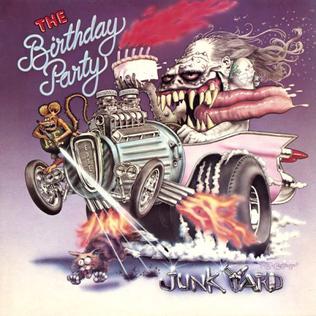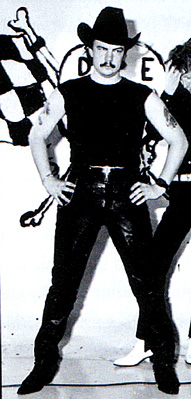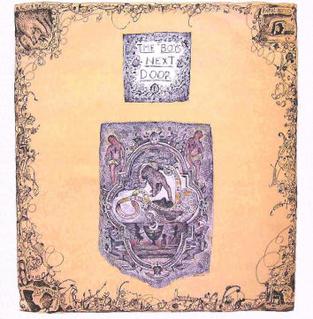
The Saints were an Australian rock band formed in Brisbane, Queensland in 1973. Founded by singer-songwriter Chris Bailey, drummer Ivor Hay, and guitarist-songwriter Ed Kuepper, they originally employed fast tempos, raucous vocals and a "buzzsaw" guitar sound that helped initiate punk rock in Australia and identified them with the greater international movement.

The Birthday Party were an Australian post-punk band, active from 1977 to 1983. The group's "bleak and noisy soundscapes," which drew irreverently on blues, free jazz, and rockabilly, provided the setting for vocalist Nick Cave's disturbing tales of violence and perversion. Their 1981 single "Release the Bats" was particularly influential on the emerging gothic scene. Despite limited commercial success, The Birthday Party's influence has been far-reaching, and they have been called "one of the darkest and most challenging post-punk groups to emerge in the early '80s."

Nick Cave and the Bad Seeds are an Australian rock band formed in 1983 by vocalist Nick Cave, multi-instrumentalist Mick Harvey and guitarist-vocalist Blixa Bargeld. The band has featured international personnel throughout its career and presently consists of Cave, violinist and multi-instrumentalist Warren Ellis, bassist Martyn P. Casey, guitarist George Vjestica, touring keyboardist/percussionist Larry Mullins, also known as Toby Dammit, and drummers Thomas Wydler (Switzerland) and Jim Sclavunos. Described as "one of the most original and celebrated bands of the post-punk and alternative rock eras in the '80s and onward", they have released eighteen studio albums and completed numerous international tours.

Live Seeds is the first official live album by Australian post-punk band, Nick Cave and the Bad Seeds. The album was recorded live from 1992 to 1993, at various concerts throughout Europe and Australia, at the touring stage promoting their previous studio album, Henry's Dream. Nick Cave wanted to give the songs a raw feeling as originally intended before production problems occurred. Live Seeds includes a not previously studio-recorded track, "Plain Gold Ring", which is a cover of a song performed by Nina Simone.

Anita Louise Lane was an Australian singer-songwriter who was briefly a member of the Bad Seeds with Nick Cave and Mick Harvey and collaborated with both bandmates. Lane released two solo albums, Dirty Pearl (1993) and Sex O'Clock (2001).
Tuff Monks were a short-lived band consisting of Nick Cave, Mick Harvey and Rowland S. Howard with Robert Forster, Lindy Morrison and Grant McLennan. Their only release was the 1982 7" 45 rpm single "After the Fireworks", on the Australian label, Au Go Go Records. The lead track was co-written by Cave, Forster and McLennan.
The Moodists were an Australian post-punk band. They were formed in late 1980 by Dave Graney on lead vocals, Clare Moore on drums and Steve Miller on guitar, all from punk group the Sputniks. They added bass guitarist Chris Walsh in early 1981, and in April 1983 added guitarist Mick Turner. They issued their sole studio album, Thirsty's Calling, in April 1984. Turner left in January 1985 and the group disbanded in 1987.

Michael John Harvey is an Australian musician, singer-songwriter, composer, arranger and record producer. A multi-instrumentalist, he is best known for his long-term collaborations with Nick Cave, with whom he formed The Boys Next Door, The Birthday Party and Nick Cave and the Bad Seeds.
Phillip Calvert is an Australian rock drummer and producer best known for his playing in the post-punk band The Birthday Party with Nick Cave.

Rowland Stuart Howard was an Australian rock musician, guitarist and songwriter, best known for his work with the post-punk group The Birthday Party and his subsequent solo career.

Missing Link Records was an Australian-based independent record label established in 1977. The Missing Link label was created by Keith Glass and David Pepperell who were the owners of a Melbourne record store of the same name. The name was taken from a 1960s Australian rock band, The Missing Links. The label's initial releases were two retrospective 7-inch singles, "The Ultimate Garage Band" by The Union and "Living in the 60's" by Cam-Pact, both of which band from the 1960s that the owners had respectively performed with. Following a few more releases Pepperell departed and the label took on a new contemporary release program to reflect the punk-new wave movement of the late 1970s. According to rock music historian, Ian McFarlane, "[it] was a cornerstone organisation on Melbourne's independent scene of the late 1970s". The label became influential through the release of both Australian and overseas material, scoring a top 20 hit single with the local release of The Flying Lizards kitchen electronic version of "Money" (1979), when it was passed over by Festival Records.

Anthony Lawrence Cohen was an Australian music record producer and sound engineer. He worked with Nick Cave's groups the Birthday Party, and then the Bad Seeds from 1979 to 2001. In mid-1986 he followed Cave to London and then onto Berlin, in January 1987, to continue to work on their material. At the ARIA Music Awards of 1994 Cohen won Producer of the Year for The Cruel Sea's second album, The Honeymoon Is Over. At the 1995 ceremony he won Producer of the Year and Engineer of the Year for the Cruel Sea's Three Legged Dog. Cohen had been a long-term alcohol and drug user, his health deteriorated in the 2010s and he died in 2017 at Dandenong Hospital, aged 60. In November 2017 he was posthumously inducted into the Music Victoria Hall of Fame.

Junkyard is the third studio album by Australian post-punk group the Birthday Party. It was released on 10 July 1982 through the label 4AD in the UK and through Missing Link Records in Australia. It was the group's last full-length studio recording. It has received critical acclaim.

Tracy Franklin Pew was an Australian musician, and bassist for The Birthday Party. He was later a member of The Saints, and worked with Nick Cave and the Bad Seeds.

Hee Haw is the second release and first EP by the Australian post-punk band the Boys Next Door. The Hee Haw EP was released in 1979 by the independent label, Missing Link Records.

"Shivers" is a song by the Australian post-punk band the Boys Next Door, who would later become the Birthday Party. It is the tenth and final track from the band's debut studio album Door, Door, released in 1979 on Mushroom Records. It was released as the album's only single in May 1979, backed with the B-side "Dive Position".
Keith Robert Glass is an Australian country music singer-songwriter, guitarist, musical theatre actor, record label owner, producer and journalist. In April 1967 he formed a soul music group, Cam-Pact, which released four singles and an extended play, Something Easy. He left by June 1969 to appear in the Australian stage production of Hair as Berger. As a solo artist Glass released country and R&B albums, Going Over Old Ground (1989), Living Down My Past (1991), Smoke and Mirrors (1997), Southerly Buster, Australian Soul and Miss Ala.
The discography of The Birthday Party, an Australian post-punk band, consists of four studio albums, two live albums, six compilation albums, six extended plays and nine singles. The group began under various names in Melbourne in 1973; formed by vocalist Nick Cave, guitarist Mick Harvey, drummer Phill Calvert, guitarist John Cocivera, bassist Brett Purcell, and saxophonist Chris Coyne —all of whom were students at Caulfield Grammar School. By 1978, following several membership changes, the band consisted of Cave, Harvey and Calvert with bassist Tracy Pew and guitarist Rowland S Howard. Under the name The Boys Next Door, the band released several singles and two studio albums, Door, Door in 1979 on Mushroom Records and The Birthday Party in 1980 on Missing Link Records.

"Release the Bats" is a song by Australian post-punk band The Birthday Party. Written by Nick Cave and Mick Harvey, the song was released as a single on 31 July 1981 through 4AD record label, with the B-side "Blast Off". The recordings were produced by the band and Nick Launay. The single charted on UK Indie Chart, peaking at number 3.
Equal Local were an Australian synth-pop band, formed in Melbourne, Victoria in 1980. The original line-up was Dean Richards on guitar, Philip Jackson on synthesisers, trumpet and rhythm generator, Melissa Webb on synthesisers and piano, Bryce Perrin on double bass, and Mick Hauser on saxophone. Richards and Jackson were ex-members of electronic post-punk group Whirlywirld.













